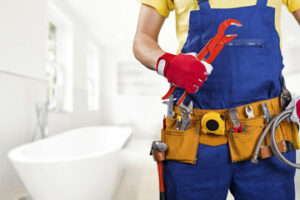JG Plumbing includes the pipes and fixtures that deliver fresh water into buildings and remove waste water, including sewage. This system is essential for human health and sanitation. It also supports a range of other industrial and commercial activities.

Plumbers install, repair and maintain these systems. Their work must comply with building codes and regulations to ensure safe operation.
Plumbing involves the installation of pipes and fixtures to supply water, remove waste, and maintain hygienic conditions in buildings and other structures. It includes activities such as connecting a faucet to a pipe, installing water heaters, and inspecting and testing the plumbing system for leaks. A plumber may also repair or replace parts of the system, such as valves and fittings.
The primary function of a plumbing system is to provide clean, potable water for human use. The system also removes waste and sewage, protecting against the spread of disease. For these reasons, the plumbing industry is highly regulated. Plumbers must be licensed to ensure that they meet health and safety standards.
To become a plumber, an individual must complete an apprenticeship and pass a trade exam. In addition, he or she must obtain a state or provincial license. The National Building Code of Canada sets the minimum standards for plumbing construction and installations, but provinces and territories may set additional requirements. For example, some jurisdictions require that plumbers use lead-free pipes and fixtures.
When working on new construction, plumbers must lay underground pipes before the foundation is poured. This requires careful execution to ensure that the pipes are placed in the correct position and at the right depth. Once the structure is up, plumbers must connect the internal plumbing to external water and sewer systems. This involves cutting and tapping into the existing pipes, and it requires precision to ensure that water flows properly and that there are no leaks.
After the pipes are in place, plumbers can install fixtures like sinks, bathtubs, showers, and toilets. These fixtures are often made from durable materials, such as copper, PVC, PEX, or stainless steel, and they can withstand a high level of water pressure. In some cases, plumbers must install specialized fixtures for medical or laboratory uses.
Plumbers must be able to recognize and diagnose problems with the plumbing system quickly and accurately. This requires extensive knowledge of common plumbing issues and solutions, as well as a thorough understanding of the plumbing codes and regulations in each jurisdiction. It is also important for plumbers to have good communication skills in order to interact with customers and explain complex issues clearly.
Repair
Plumbing repairs involve fixing or restoring the functionality of water supply systems in buildings. This can include fixing leaky faucets, toilets, and bathtubs; repairing or replacing damaged pipes; and cleaning drains. Plumbers can also install, repair, and maintain water heaters. They have the tools and knowledge to diagnose problems, find the best solutions, and make quick fixes. They follow all safety guidelines when working with water and sewage. Plumbing is an essential service for any home or business.
Maintenance
The plumbing system delivers fresh, clean water to fixtures and appliances like sinks, toilets, and showers. It also takes sewage and waste away from these fixtures and into a sewer system to be treated or carried away. For these systems to work properly, they must follow the laws of gravity and pressure along with basic safety precautions. This is where plumbers come in. Plumbers are skilled professionals who install, repair, and maintain these important water and gas lines.
Plumbing work can be complicated and hazardous, so it’s best left to a professional. A plumber will be able to diagnose problems and fix them quickly and efficiently. Some common plumbing problems include leaky pipes, clogged drains, and damaged or worn-out fixtures. Regular maintenance can help prevent these problems from occurring and keep your plumbing system running smoothly for years to come.
The plumbing industry is regulated at the federal, state, and local levels. Plumbers must be licensed by their respective authorities to ensure they have the necessary skills and knowledge to perform their jobs correctly. They must also adhere to strict standards to safeguard the health and safety of building occupants.
There are several types of plumbers, including master plumbers, journeyman plumbers, and licensed apprentices. Master plumbers have years of experience and are qualified to do complex tasks like inspecting and installing new pipework. Journeyman plumbers have extensive knowledge of existing plumbing systems and are qualified to make repairs. Licensed apprentices are students who are working towards becoming master plumbers themselves. They are trained to handle basic installation and repair tasks under the supervision of a master plumber.
Plumbing systems are complex and must be inspected regularly to ensure they’re functioning properly. A faulty plumbing system can lead to expensive damage that requires immediate attention. Regular maintenance from a professional plumber can help keep your plumbing system in good condition and avoid costly repairs in the future.
Replacement
Whether you’re replacing an old, worn-out faucet or installing a new kitchen sink and dishwasher, it is important to get the job done right. Incorrect installation or low-quality hardware can result in leaks, water damage, and even health hazards. A professional plumbing contractor will have the knowledge, tools, and experience to ensure your plumbing system is up and running as quickly and efficiently as possible.
Plumbing is the network of pipes, fixtures, and appliances that supply clean drinking water, remove waste water, and control the flow of sewage and venting gases in a building. It includes water and sewage systems, drainpipes, and venting that carries waste away from inhabited areas to treatment plants.
